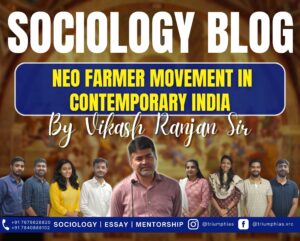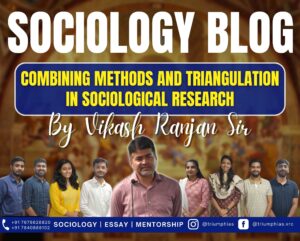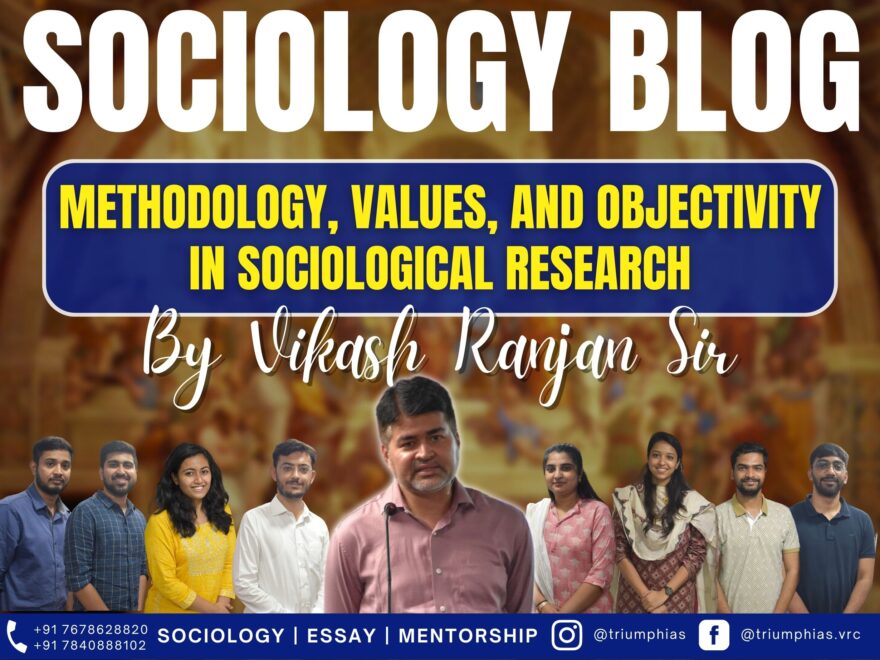Methodology, Values and Objectivity
(Relevant for Sociology Optional for Civil Services Examination)


Defining objectivity and value-freedom
One of the reasons why sociologists have been so concerned with the question of whether sociology is a science is because of the widespread assumption that science is objective, or value-free.
Robert Bierstedt: Objectivity means that the conclusions arrived by at as the result of inquiry and Investigation are independent of the race, colour, creed, occupation, nationality, religion, moral preference, and political predisposition of the investigator. If his research is truly objective, it is independent of any subjective elements, any personal desires, that he may have.
Value-freedom in classical sociology
There has been debate about whether sociology can be value free or not. Another question is that should sociology strive to be value free?
- Many of the founders of sociology believed that sociology could and should be value-free. Early positivists such as Comte and Durkheim argued that objectivity was attainable by adopting a ‘scientific methodology.
- Marx also believed his sociology was objective and ‘scientific’, although he saw society very differently.
- Weber did not think complete value-freedom was possible, but he did believe that, once a topic for research had been chosen, the researcher could be objective.
Weber and value relevance
- According to this view, total objectivity it impossible because values inevitably enter every stage of the production of sociological knowledge.
- Weber recognized that values would influence the choice of topics for study. Weber believed that researcher value creeps in during selection of topic. He termed it value relevance.
- Researchers would choose to research topics which they feel are important for society and are significant enough to research.
- Weber himself chose to study the advent of capitalism and the nature of bureaucracy because he saw these the most important developments in Western societies.
Domain assumptions
- Having selected a topic, Sociologists subsequently decide which facets of the subject to investigate and determine the methodology they will employ to examine those aspects.
- According to Alvin Gouldner (1970), this involves making ‘domain assumptions. These are the basic assumptions that sociologists make about the nature of social life and human behaviour.
- Domain assumptions about man and society might include,
- dispositions to believe that men are rational or irrational;
- that society is precarious of fundamentally stable;
- that social problems will correct themselves without planned intervention;
- human behaviour is unpredictable; that man’s true humanity resides in his feelings and sentiments.
How to overcome subjectivity
- A way to overcome subjectivity is by specifying precisely the procedures that should be followed in conducting research. This allows the results to be checked and confirmed for reliability and allows falsification too if possible.
- Positivists such as Durkheim believed that such problems can be solved by limiting research to the study of observable empirical facts. Durkheim believed if there is no ambiguity about the facts that are used as data in research then objectivity can be achieved.
Issue of Subjectivity Various Perspectives
- Hammersley argues that it is never possible to ensure that different researchers will apply a procedure in exactly the same ways, however closely it is specified. He states that the results not only depend non researcher, methods but to also on respondents in social research
- Hammersley further argues that ordinary everyday perceptual capabilities’ can themselves be fenced by cultural faces which wad to different group seeing the same things in different ways, Error can also result from misunderstanding what is seen.
- We may employ careful observation and uncontroversial modes of inference yet still reach false conclusions.
- Jack Douglas argued that sociologists must ‘study the phenomena of everyday life on their own terms’; they must preserve the integrity of that phenomena. While phenomenologists might be looking in the right direction, the problem of validity remains unsolved.
- Critiical researchers believe it is important to understand how the social world is seen from the viewpoint of those being studied. It’s equally crucial for them to extend their exploration beyond the conventional understanding held by individuals, revealing the underlying systems of subjugation that exist beneath the routines of daily existence.
- Critics believe that the oppressive structures they discovery reflect their own prejudices feminists will always find patriarchal oppression, Marxists will find class exploitation, critical gay sociologists will find homophobia, and anti-racists will find racism.
- In Anti-Minotaur the myth of a value-free sociology (1975). Gouldner argued that just as the bull and the man in the mythical Minotaur cannot be separated. In similar manner facts and values cannot be separated in sociological research. Researchers cannot escape their own values and biases.
- Weber argued that sociologists’ values should be kept out of their research, and that they should not give value judgments about right or wrong,
- Gouldner regarded this as dishonest. Since sociologists must have values, they should be open about them so that others can decide for themselves to what degree values have influenced the research. Hence according to Gouldner says that there can be no value free sociology.
- Postmodernists like Lyotard reject together the possibility of producing any objective knowledge. To Lyotard, the creation of knowledge is just a language-game which can only be judged in terms of its salebility There is no way of distinguishing between true and untrue knowledge, no way of being objective.
Towards Objectivity In Research : Way Forward
- Hammersley proposes re- conceptualizing the issue of objectivity as being concerned with ‘threats to validity that stem from the background assumptions, Preferences, commitments, etc., of the researcher’He defines certain values :
- commitment to truth and truthfulness
- intellectual sobriety
- intellectual courage
- Phil Carspecken along with other critical social scientists, believes sociologists should be committed to changing the world. Humans might view the world differently, there is an objective world that resists human action. The way the material world resists our actions provides some basis for reaching agreement about objective statements.
- Truth claims are claims that you have made an objective statement are based upon reaching such agreements about what does and does not exist. These agreements in turn can be used to evaluate the claims of different theories. A critical researcher cannot therefore find whatever they want to find.
- Truth claims even if accepted now, may be rejected at some point in the future. A consensus about what is and is not true may break down. However, because they are based upon reaching agreements about what is true, they have a more solid foundation than individual interpretations.
- Such common ground may not always be attainable, but often it is, and some rational evaluation of values becomes possible.
- According to this view point values are integral to sociology and indeed to all disciplines, but that does not prevent rational debate and the empirical setting of the ones Sociology can make claims about the truth and hope to gain acceptance for them from the viewpoint, sociologists should also accept and welcome a comment to sing the production of sociological knowledge to try to improve society.
Conclusion
- Researchers can mitigate the extent to which their research distorts social reality by being self-reflective. By transparently articulating their methods, they enable fellow researchers to assess their work and independently verify their findings.
- Social science research impacts social policies to some degree. Without it, policymakers would lack substantial insights into the effectiveness of their policies. Despite the imperfections inherent in social science research, policymaking would otherwise rely on little more than guesswork

To master these intricacies and fare well in the Sociology Optional Syllabus, aspiring sociologists might benefit from guidance by the Best Sociology Optional Teacher and participation in the Best Sociology Optional Coaching. These avenues provide comprehensive assistance, ensuring a solid understanding of sociology’s diverse methodologies and techniques.
META TAGS: methodology, values, objectivity, sociological research, subjectivity, domain assumptions, perspectives, debates, objectivity in research, sociological knowledge, social policies, researchers, transparency, self-reflective, subjectivity, perspectives, methodology, values, objectivity, sociological research, subjectivity, domain assumptions, perspectives, debates, objectivity in research, sociological knowledge, social policies, researchers, transparency, self-reflective, subjectivity, perspectives
 |
 |
Explore Sociology Optional Syllabus
Paper-1
FUNDAMENTALS OF SOCIOLOGY
- Sociology – The Discipline
- Sociology as Science:
- Research Methods and Analysis:
- Sociological Thinkers:
- Karl Marx- Historical materialism, mode of production, alienation, class struggle.
- Emile Durkheim- Division of labour, social fact, suicide, religion and society.
- Max Weber- Social action, ideal types, authority, bureaucracy, protestant ethic and the spirit of capitalism.
- Talcott Parsons- Social system, pattern variables.
- Robert K. Merton- Latent and manifest functions, conformity and deviance, reference groups.
- Mead – Self and identity.
- Stratification and Mobility:
- Concepts- equality, inequality, hierarchy, exclusion, poverty and deprivation.
- Theories of social stratification- Structural functionalist theory, Marxist theory, Weberian theory.
- Dimensions – Social stratification of class, status groups, gender, ethnicity and race.
- Social mobility- open and closed systems, types of mobility, sources and causes of mobility.
- Works and Economic Life:
- Social organization of work in different types of society- slave society, feudal society, industrial /capitalist society
- Formal and informal organization of work.
- Labour and society.
- Politics and Society:
- Sociological theories of power.
- Power elite, bureaucracy, pressure groups, and political parties.
- Nation, state, citizenship, democracy, civil society, ideology.
- Protest, agitation, social movements, collective action, revolution.
- Religion and Society:
- Sociological theories of religion.
- Types of religious practices: animism, monism, pluralism, sects, cults.
- Religion in modern society: religion and science, secularization, religious revivalism, fundamentalism.
- Systems of Kinship:
- Family, household, marriage.
- Types and forms of family.
- Lineage and descent.
- Patriarchy and sexual division of labour.
- Contemporary trends.
- Social Change in Modern Society:
- Sociological theories of social change.
- Development and dependency.
- Agents of social change.
- Education and social change.
- Science, technology and social change.
Paper-2
INDIAN SOCIETY: STRUCTURE AND CHANGE
INTRODUCING INDIAN SOCIETY
- Perspectives on the study of Indian society:
- Indology (GS. Ghurye).
- Structural functionalism (M N Srinivas).
- Marxist sociology (A R Desai).
- Impact of colonial rule on Indian society :
- Social background of Indian nationalism.
- Modernization of Indian tradition.
- Protests and movements during the colonial period.
- Social reforms.
SOCIAL STRUCTURE
- Perspectives on the study of Indian society:
- The idea of Indian village and village studies.
- Agrarian social structure – evolution of land tenure system, land reforms.
- Caste System:
- Perspectives on the study of caste systems: GS Ghurye, M N Srinivas, Louis Dumont, Andre Beteille.
- Features of caste system.
- Untouchability – forms and perspectives.
- Tribal communities in India
- Definitional problems.
- Geographical spread.
- Colonial policies and tribes.
- Issues of integration and autonomy.
- Social Classes in India:
-
- Agrarian class structure.
-
-
- Industrial class structure.
- Middle classes in India.
-
- Systems of Kinship in India:
- Lineage and descent in India.
- Types of kinship systems.
- Family and marriage in India.
- Household dimensions of the family.
- Patriarchy, entitlements and sexual division of labour
- Religion and Society:
- Religious communities in India.
- Problems of religious minorities.
- Patriarchy, entitlements and sexual division of labour
SOCIAL CHANGES IN INDIA
- Visions of Social Change in India:
- Idea of development planning and mixed economy
- Constitution, law and social change.
- Education and social change.
- Rural and Agrarian transformation in India:
- Programmes of rural development, Community Development Programme, cooperatives,poverty alleviation schemes
- Green revolution and social change.
- Changing modes of production in Indian agriculture.
- Problems of rural labour, bondage, migration.
3. Industrialization and Urbanisation in India:
-
- Evolution of modern industry in India.
- Growth of urban settlements in India.
- Working class: structure, growth, class mobilization.
- Informal sector, child labour
- Slums and deprivation in urban areas.
4. Politics and Society:
-
- Nation, democracy and citizenship.
- Political parties, pressure groups , social and political elite
- Regionalism and decentralization of power.
- Secularization
5. Social Movements in Modern India:
-
- Peasants and farmers movements.
- Women’s movement.
- Backward classes & Dalit movement.
- Environmental movements.
- Ethnicity and Identity movements.
6. Population Dynamics:
-
- Population size, growth, composition and distribution
- Components of population growth: birth, death, migration.
- Population policy and family planning.
- Emerging issues: ageing, sex ratios, child and infant mortality, reproductive health.
7. Challenges of Social Transformation:
-
- Crisis of development: displacement, environmental problems and sustainability
- Poverty, deprivation and inequalities.
- Violence against women.
- Caste conflicts.
- Ethnic conflicts, communalism, religious revivalism.
- Illiteracy and disparities in education.
Why Vikash Ranjan’s Classes for Sociology?
Proper guidance and assistance are required to learn the skill of interlinking current happenings with the conventional topics. VIKASH RANJAN SIR at TRIUMPH IAS guides students according to the Recent Trends of UPSC, making him the Best Sociology Teacher for Sociology Optional UPSC.
At Triumph IAS, the Best Sociology Optional Coaching platform, we not only provide the best study material and applied classes for Sociology for IAS but also conduct regular assignments and class tests to assess candidates’ writing skills and understanding of the subject.
Choose The Best Sociology Optional Teacher for IAS Preparation?
At the beginning of the journey for Civil Services Examination preparation, many students face a pivotal decision – selecting their optional subject. Questions such as “which optional subject is the best?” and “which optional subject is the most scoring?” frequently come to mind. Choosing the right optional subject, like choosing the best sociology optional teacher, is a subjective yet vital step that requires a thoughtful decision based on facts. A misstep in this crucial decision can indeed prove disastrous.
Ever since the exam pattern was revamped in 2013, the UPSC has eliminated the need for a second optional subject. Now, candidates have to choose only one optional subject for the UPSC Mains, which has two papers of 250 marks each. One of the compelling choices for many has been the sociology optional. However, it’s strongly advised to decide on your optional subject for mains well ahead of time to get sufficient time to complete the syllabus. After all, most students score similarly in General Studies Papers; it’s the score in the optional subject & essay that contributes significantly to the final selection.
“A sound strategy does not rely solely on the popular
Opinion of toppers or famous YouTubers cum teachers.”
It requires understanding one’s ability, interest, and the relevance of the subject, not just for the exam but also for life in general. Hence, when selecting the best sociology teacher, one must consider the usefulness of sociology optional coaching in General Studies, Essay, and Personality Test.
The choice of the optional subject should be based on objective criteria, such as the nature, scope, and size of the syllabus, uniformity and stability in the question pattern, relevance of the syllabic content in daily life in society, and the availability of study material and guidance. For example, choosing the best sociology optional coaching can ensure access to top-quality study materials and experienced teachers. Always remember, the approach of the UPSC optional subject differs from your academic studies of subjects. Therefore, before settling for sociology optional, you need to analyze the syllabus, previous years’ pattern, subject requirements (be it ideal, visionary, numerical, conceptual theoretical), and your comfort level with the subject.
This decision marks a critical point in your UPSC – CSE journey, potentially determining your success in a career in IAS/Civil Services. Therefore, it’s crucial to choose wisely, whether it’s the optional subject or the best sociology optional teacher. Always base your decision on accurate facts, and never let your emotional biases guide your choices. After all, the search for the best sociology optional coaching is about finding the perfect fit for your unique academic needs and aspirations.
Follow us :
🔎 https://www.instagram.com/triumphias
🔎https://www.youtube.com/c/TriumphIAS
https://t.me/VikashRanjanSociology
Find More Blogs
|
Scope of the subject and comparison with other social sciences |
|||
|
|
|
|
Modernity and social changes in Europe |


2 comments